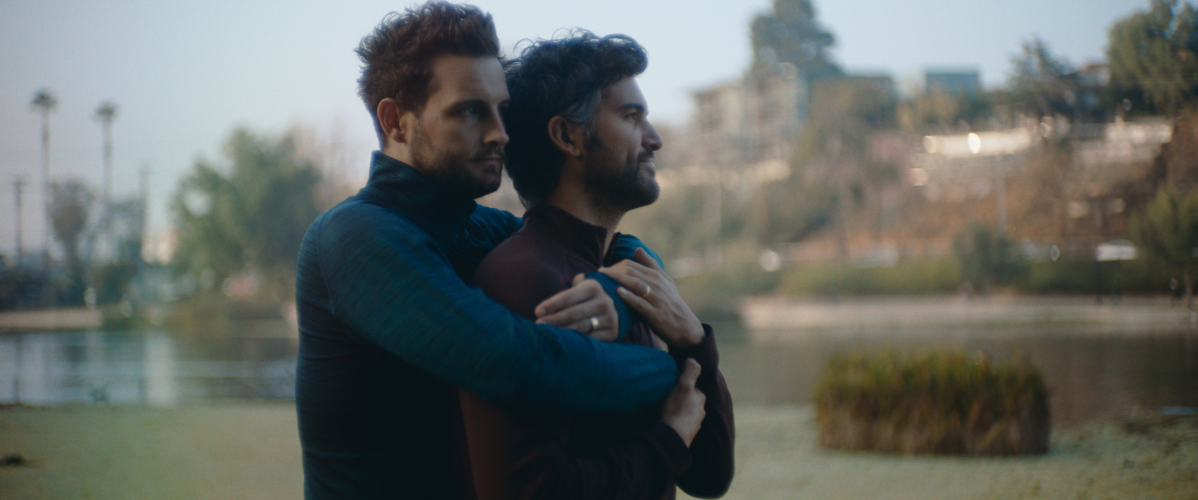“The Mattachine Family” could not be any more self-conscious about the cultural issues it touches on. Its characters talk about assimilation, the pressure placed on gay men to act provocatively, living in the public eye, and the ethics of sex work. Incorporating these subjects into a believable drama requires a much lighter touch than screenwriter Danny Vallentine has. (His husband Andy Vallentine directed the film, and the closing credits call it a “a Vallentine family film.”) The film tells rather than showing. The problem starts in the opening moments, dominated by a voice-over from Thomas (Nicholas Tortorello). He relates his childhood attraction to male cartoon characters, love of dancing to pop music and, on a grimmer note, the fact that his father died when he was young.” He brings up the fact that he couldn’t imagine becoming a father himself when he was that age. “The Mattachine Family” barely scratches the surface of how queer men experience time, even as its first half relies on Thomas’ memories, photographs and home movies to carry it.
Thomas and his husband Oscar’s (Juan Pablo Di Pace) year as foster parents to six-year-old Arthur has just ended, with the boy returned to his biological mother. Oscar, who worked as a child actor and then saw his career dry up when he was outed, is in line for a promising role on a TV series. The catch is that taking it would require the couple, who live in Los Angeles, to move to Michigan, where it’s shot. Thomas continues to pursue his options as a father, while Oscar places his career first. In the meantime, Thomas hangs out with a group of friends he met long ago, including his “gay best friend” Jamie (Jake Choi), a sex worker who makes a living selling nude photos online, and lesbian couple Sonia (Cloie Watts Taylor) and Leah (Emily Hampshire).
“The Mattachine Family” takes its name from the Mattachine Society, a gay rights organization which formed in 1950. Thomas takes Leah to the steps named after the group. They’ve been credited with setting the stage for the activism that exploded after Stonewall, but this film seems weirdly dislocated from politics. (It never mentions that Mattachine Society co-founder Harry Hay, whom it cites by name, was a communist.) Thomas talks about the expanding life choices which have become available to gay men since he grew up, framing them entirely in terms of marriage and fatherhood. The film sings the praises of the chosen family as a refuge from a hostile world, but its vision of community is purely personal.
In the milieu where Thomas lives and works, being gay isn’t any more contentious than having an arm covered by a tattoo sleeve. There’s a lack of curiosity about what it means for Oscar to become a celebrity as an out gay man after being humiliated for his sexuality earlier in life; instead, the film blames him for not wanting to be a dad.
A major part of the problem is that no one except Thomas comes across like a real person. When he and Oscar go to an art gallery and argue about a Robert Mapplethorpe photo of a kinky gay couple, the subject is promising, but the actual words sound like social media discourse. This is a running issue, most gratingly when Leah and Sonia argue about whether sex work is always degrading. The script sounds like Vallentine ran through a series of points he wanted to hit and created characters and their actions around them. While the cast is diverse ethnically, Jamie falls into a stereotype of femme Asian-American men, present to emphasize Thomas’ masculinity and avoidance of hypersexuality. Apart from Tortorello, the performances tend to fall into an inflated excess, especially Heather Matarazzo’s one-note turn as a lesbian mom influencer. “The Mattachine Family” maintains a lighthearted tone, even when addressing its most difficult emotions. But it struggles to function as a comedy, settling for a cuteness that’s rarely laugh-out-loud funny. (For example, a boy named Huck calls himself “F**k.”) Thomas’ voice-over seems much more serious than most of the actions that follow it.
While so many movies and TV shows about LGBTQ people concentrate on young people coming out, “The Mattachine Family” explores the pressures of adulthood, with Thomas and Oscar trying to preserve their marriage despite their different attitudes towards becoming fathers. Sadly, it settles for a comfortable blandness suited to basic cable and a conservative undercurrent that views parenthood as the conclusion of gay liberation.
“The Mattachine Family” | Directed by Andy Vallentine | Huckleberry Media | Available on VOD June 4th































